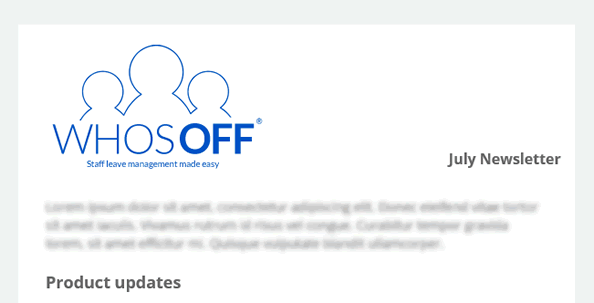It’s always difficult when a team member resigns. Losing people is sad and frustrating, especially if you didn’t foresee them leaving. And there are practical matters to consider, too – like what to do with their remaining holiday.
Departing employees are keen to know what happens to the rest of their annual leave. So WhosOff has put together some useful information to help manage your response:
How much leave are staff entitled to when they leave your company?
Legally, UK employees can take 28 days’ annual leave each year, including Bank Holidays. Your company may even choose to offer them more holiday. Either way, when someone resigns, calculating their pro-rata holiday entitlement is one of your first tasks.
Let’s say your holiday year starts on 1st January and your employee works full time. If they hand in their notice on 1st October with a one-month notice period, they're entitled to 23.5 days' leave. The government holiday calculator can work this information out for you.
After calculating their entitlement, you'll face one of three scenarios:
- Your employee hasn’t taken enough holiday
- Your employee has taken the exact amount they’re entitled
- They've taken more than the amount they’re entitled to
If your employee falls into category two, there’s nothing further to worry about. That person can work their notice period as agreed and leave your company. But it's rarely this neat.
Usually, your employee has some holiday owing, or they owe days to you. That's why you need to know their legal entitlements.
What happens if your employee has holidays left to use?
Employers must pay departing staff for any statutory holiday they haven't used (pro-rata). You can add this amount to their final salary payment.
To keep costs down, however, you can make staff take any remaining holiday during their notice period. Even if the employee would prefer payment. This approach can work well if your departing staff member has a long notice period. Just make sure you give them enough warning: at least two days per day off.
If your team member has a short notice period or it’s a busy time of year, it might not be practical to take time off. It may also impact the quality of their handover. As a result, some employers choose to pay staff for untaken leave instead.
What happens if your employee has taken too much holiday?
Sometimes, your departing employee will be in the unfortunate position that they’ve taken too much time off.
For example, let's say your holiday year starts on 1st January and your employee's last day is 25th July. Your departing staff member has accrued 15.9 days’ holiday if they work full-time. If that person has already taken a 10-day holiday at Easter and a 10-day summer holiday, they've used 20/28 days. This means they owe you 4.1 days’ holiday.
If you find yourself in this scenario, there are two potential options:
- You notify your employee that they will need to pay for the extra holiday they’ve taken
- You let your employee leave without paying off the extra days as a goodwill gesture
If you choose option one, make sure you confirm the number of extra days in writing with your employee. This includes how much money you will deduct from their final salary payment to cover these days. It’s helpful to write this procedure into your annual leave policy.
Choosing option two can help you part ways with an employee on good terms. But if you gift leave to one person, there’s an expectation you will do this for future departing staff.
What’s the best way to manage unused staff holiday?
The key to a smooth handover when someone leaves your company is being clear and consistent. If you’ve got protocols in place, everyone knows what to expect.
An online holiday planner like WhosOff allows you to check staff data and make smarter decisions. For example, you can track how many days your departing employee has taken to see if they owe holiday. You can also use the calendar to see who else has booked time off during their notice period, preventing calendar clashes.
A well-organised notice period can also help you to part ways with employees on good terms. With a strong company culture, you never know when good talent might come back.
Get greater control over your staff holiday calendar with WhosOff. Book your free trial to track employee leave and enforce your holiday policy.
Photo by Pixabay of Pexels.com

